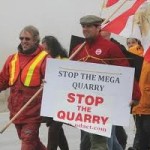
Mega-quarry pits farmland against industry.
By David Suzuki
A billion tonnes of limestone lie beneath the rural countryside in Melancthon Township, 100 kilometres north of Toronto. A plan to remove it spotlights the challenges faced everywhere when the desire to protect valuable and ever-diminishing farmland clashes with efforts to push industrial development.